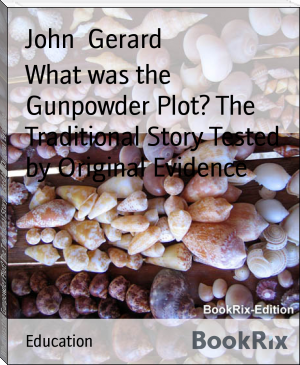What was the Gunpowder Plot? The Traditional Story Tested by Original Evidence - John Gerard (interesting novels in english txt) 📗

- Author: John Gerard
Book online «What was the Gunpowder Plot? The Traditional Story Tested by Original Evidence - John Gerard (interesting novels in english txt) 📗». Author John Gerard
Never, assuredly, was a true story so hard to tell. Contradictions like these, upon every single point of the narrative, are just such as are wont to betray the author of a fiction when compelled to be circumstantial.
To say nothing of the curious discrepancies as to the date of the warning, it is clearly impossible to determine the locality of Guy's arrest. The account officially published in the "King's Book" says that this took place in the street. The letter to the ambassadors assigns it to the cellar and afterwards to the street; that to Parry, to the cellar only. Faukes himself, in his confession of November 5th, says that he was apprehended neither in the street nor in the cellar, but in his own room in the adjoining house. Chamberlain writes to Carleton, November 7th, that it was in the cellar. Howes, in his continuation of Stowe's Annals, describes two arrests of Faukes, one in the street, the other upstairs in his own chamber. This point, though seemingly somewhat trivial, has been invested with much importance. According to the time-honoured story, the baffled desperado roundly declared that had he been within reach of the powder when his captors appeared, he would have applied a match and involved them in his own destruction. This circumstance is strongly insisted on not only in the "King's Book," but also in his Majesty's speech to Parliament on November 9th, which declared, "and in that also was there a wonderful providence of God, that when the party himself was taken he was but new come out of his house from working, having his fire-work for kindling ready in his pocket, wherewith, as he confesseth, if he been taken immediately before, he was resolved to have blown up himself with his takers." We learn, however, from Cecil's earliest version of the history, that Faukes was apprehended in the very situation most suitable for such a purpose, "in the place itself, as he was busy to prepare his things for execution," while Chamberlain adds that he was actually engaged in "making his trains."
Far more serious, to say nothing of the episode of the chamberlain's visit, are the divergencies of the several versions as to the very substance of the story. We are told that King James was the first to understand and interpret the letter which had baffled the sagacity of his Privy Council; that the Lords of the Council had fully interpreted it several days before the king saw it; that the said lords would not credit the king's interpretation; that the king would not believe their interpretation; and that neither the one nor the other ever interpreted it at all; that his Majesty insisted on a search being made in spite of the reluctance of his ministers; that they insisted on the search in spite of the reluctance of their royal master; and that no such search was ever proposed by either; that Knyvet was despatched expressly to look for gunpowder, with instructions to rummage the firewood to the bottom, leaving no cover in which a barrel might lie hid; and that having no instructions to do anything of the kind, nor any reason to suspect the existence of any barrels, he discovered them only by a piece of luck, so purely fortuitous as to be clearly providential. On this last point especially the contradictions are absolutely irreconcilable.
It is abundantly evident that those who with elaborate care produced these various versions were not supremely solicitous about the truth of the matter, and varied the tale according to the requirements of circumstances. As Mr. Jardine acknowledges,[264] the great object of the official accounts was to obtain credence for what the government wished to be believed, or, as Father Gerard puts it,[265] these accounts were composed "with desire that men should all conceive this to be the manner how the treason came to light." If from time to time the details were altogether transformed, it was clearly not through any abstract love of historical accuracy, but rather that there were difficulties to meet and doubts to satisfy, which had to be dealt with in order to produce the desired effect.
That, from the beginning, there was whispered disbelief, which it was held all-important to silence, is sufficiently attested by Cecil himself, when, on the very morrow of the discovery, he sent to Parry his first draft of the history. "Thus much," he wrote, "I have thought necessary to impart unto you in haste, to the end that you may deliver as much to the French king, for prevention of false bruits, which I know, as the nature of fame is, will be increased,[266] perverted, and disguised according to the disposition of men."
It does not appear why the appearance of erroneous versions of so striking an event should have been thus confidently anticipated if the facts were undeniably established; while, on the other hand, it is not a little remarkable that the narrative thus expressly designed to establish the truth, should have been forthwith abandoned and contradicted by its author in every single particular.
Important information upon the same point is furnished by Cecil in another letter, written in the following January.[267] He undertakes to explain to his correspondent how it came to pass that a circumstance of supreme importance, of which the government were fully cognizant,[268] was not mentioned in the official account. This he does as follows: "And although in his Majesty's book there is not any mention made of them [the Jesuits], and of many things else which came to the knowledge of the State, yet is it but a frivolous inference that thereby [they] seek to serve their turn, considering the purpose of his Majesty was not to deliver unto the world all that was confessed concerning this action, but so much only of the manner and form of it, and the means of the discovery, as might make it apparent, both how wickedly it was conceived by those devilish instruments, and how graciously it pleased God to deal with us in such an extraordinary discovery thereof."
Turning to the details of the story which survive the struggle for existence in the conflict of testimony, if any can be said to do so, there is abundant matter deserving attention, albeit we may at once dismiss the time-honoured legend concerning the sagacity of the British Solomon, and his marvellous interpretation of the riddling phrases which baffled the perspicacity of all besides himself.[269]
More important is Cecil's admission that the presence of the powder under the Parliament House was at least suspected for several days before anything was done to interfere with the proceedings of those who had put it there. The reasons alleged for so extraordinary a course are manifestly absurd. It was resolved, he told the ambassadors, "that, till the night before, nothing should be done to interrupt any purpose of theirs that had any such devilish practice, but rather to suffer them to go on to the end of their day." In like manner he informed the Privy Council[270] that it was determined to make no earlier search, that "such as had such practice in hand might not be scared before they had let the matter run on to a full ripeness for discovery." It certainly appears that, at least, it would have been well before the eleventh hour to institute observations as to who might be coming and going about the cellar. On the other hand, can it be imagined that any minister in his right senses would have allowed the existence of a danger so appalling to continue so long, and have suffered a desperado like Faukes to have gone on knocking about with his flint and steel and lantern in a powder magazine beneath the House of Parliament? Accidents are proverbially always possible, and in the circumstances described to us there would have been much more than a mere possibility, for the action said to have been taken by the authorities, in sending the chamberlain to "peruse" the vault, seems to have been expressly intended to give the alarm; and had the conspirators been scared it would evidently have been their safest plan to have precipitated the catastrophe, that in the confusion it would cause they might escape. How terrible such a catastrophe would have been is indicated by Father Greenway:[271] "Over and above the grievous loss involved in the destruction of these ancient and noble buildings, of the archives and national records, the king himself might have been in peril, and other royal edifices, though situate at a distance, and undoubtedly many would have perished who had come up to attend the Parliament." Moreover, the loss of life in so thickly populated a spot must have been frightful, and especially amongst the official classes.
Father Greenway expresses his utter disbelief in the incident of the chamberlain's visit:[272] "To speak my own mind," he writes, "I do not see in this portion of the story any sort of probability." He adds another remark of great importance. If the Lord Chamberlain,--and, we may add, Sir T. Knyvet,--could get into the cellar without the assistance of Faukes, to say nothing of the "other door" which makes its appearance in Cecil's first version, there is an end of the secret and hidden nature of the place, and some one else must have had a key. How, then, about the months during which the powder had been lying in it; during much of which time it had been, apparently, left to take care of itself? Did no man ever enter and inspect it before?
But questions far more fundamental inevitably suggest themselves. If, during ten, or even during five days, a minister so astute and vigilant was willing to risk the danger of an explosion, it certainly does not appear that he was much afraid of the powder, or thought there was any harm in it. We have already remarked on the strangeness of the circumstance that the plotters were able so easily to procure it. It may be observed that they appear themselves to have been disappointed with its quality, for we are told[273] that late in the summer they added to their store "as suspecting the former to be dank." Still more remarkable, however, was the conduct of the government. Immediately upon the "discovery" they instituted the most minute and searching inquiries as to every other particular connected with the conspirators. We find copious evidence taken about their haunts, their lodgings, and their associates: of the boatmen who conveyed them hither and thither, the porters who carried billets, and the carpenters who worked for them: inquiries were diligently instituted as to where were purchased the iron bars laid on top of the barrels, which appear to have been considered especially dangerous; we hear of sword-hilts engraved for some of the company, of three beaver hats bought by another, and of the sixpence given to the boy who brought them home. But concerning the gunpowder no question appears ever to have been asked, whence it came, or who furnished it. Yet this would appear to be a point at least as important as the rest, and if it was left in absolute obscurity, the inference is undoubtedly suggested that it was not wished to have questions raised. It may be added that no mention is discoverable of the augmentation of the royal stores by so notable a contribution as this would have furnished.
Neither can it escape observation that whereas the powder was discovered only on the





Comments (0)